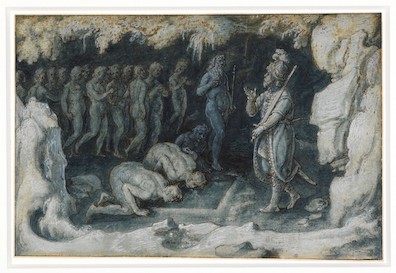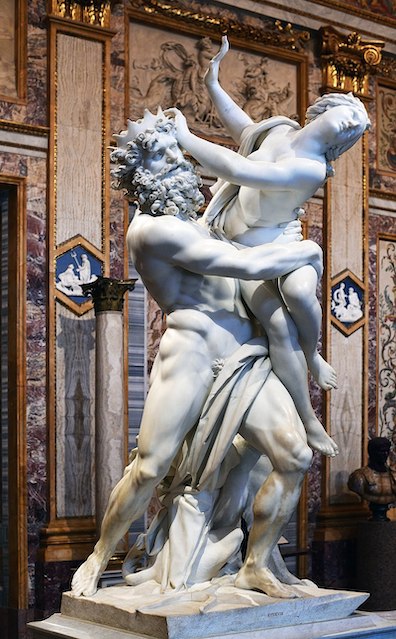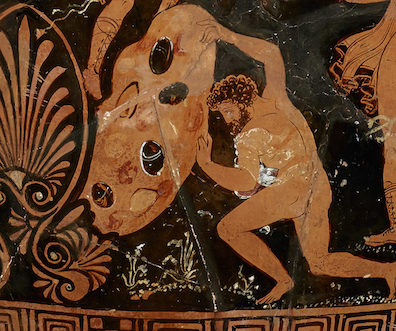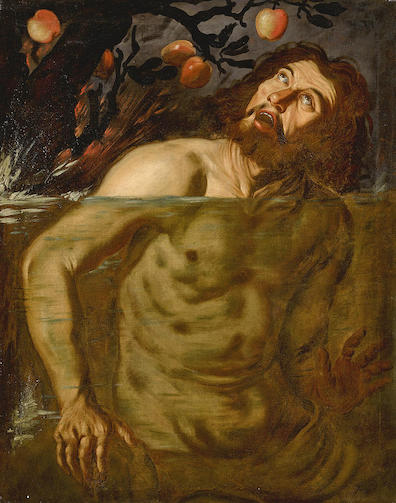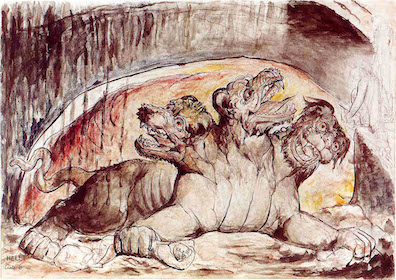In his detailed Linati schema, Joyce listed more Homeric
"Persons" for Hades than for any other chapter of Ulysses,
suggesting (even if one does not assume significant modern
correspondences for all of them) an intense engagement with
the Odyssey. The story runs as follows: In book 10
Circe advises Odysseus to sail his ship far north to a shore
where four rivers (Pyriphlegethon, Cocytus, Styx, and Acheron)
flow. There he is to dig a small square pit and fill it with
the blood of two sheep, which will attract the shades of
Hades. The Homeric dead are pale shadows of living people
eager for the life-giving force of hot blood, as Bloom thinks
in Lestrygonians: "Hot fresh blood they prescribe for
decline. Blood always needed. Insidious. Lick it up
smokinghot, thick sugary. Famished ghosts." Odysseus
gathers his men to carry out the fearsome task, but before
they can leave Circe's palace one of them, Elpenor, slips from
the roof of the palace, where he fell asleep after drinking
too much wine, and breaks his neck. In book 11, after Circe's
directions are fulfilled, Elpenor's shade comes forward, tells
Odysseus his story, and receives the promise of a decent
burial. The hero then encounters many other shades that come
crowding around the bloody pit.
Hades echoes many visual details of Book 11, as well
as some from Virgil's imitative Aeneid and Dante's
classically oriented Inferno. As the funeral
procession moves through Dublin it crosses four bodies of
water ("Dodder bridge," "The Grand Canal," "the Liffey," "the
royal canal") that recall the four Homeric rivers, as well as
similar waters in Virgil and Dante. The marble shapes in the
stone-cutter's yard next to the cemetery evoke the
shades crowding around Odysseus at the pit, appealing to be
heard: "Crowded on the spit of land silent shapes appeared,
white, sorrowful, holding out calm hands, knelt in grief,
pointing. Fragments of shapes, hewn. In white silence:
appealing." Inside the cemetery, Bloom's "How many!
All these here once walked round Dublin" vividly recalls
Dante's "I could not believe / death had undone so many" (Inferno
3.56-57). There are two more
echoes of the Inferno in this chapter, and
probably one or two of the Purgatorio as well.
The "Gloomy gardens" and "dismal fields" in Joyce's
text recall the Lugentes campi (fields of mourning)
of Virgil's unhappy lovers (Aeneid 6.440). As the
chapter ends, Bloom sees that "The gates glimmered in
front: still open. Back to the world again," echoing the
"two gates of Sleep" which confront Aeneas at the end of book
6, through one of which he goes back to the world again. Still
another Virgilian echo occurs when Simon Dedalus describes
Mulligan as his son's "fidus Achates." The
phrase "faithful Achates" used at Aeneid 1.118 names a
loyal friend of Aeneas, and Simon intends merely a scornful
contrast to Mulligan. But at 6.47-52, Achates and Deiphobe
appear as the advance party that has prepared the way for
Aeneas to descend into the underworld.
Many of Joyce's characters are plainly linked with Homeric
models. Paddy Dignam's
alcoholic death ("Blazing face: redhot. Too much John
Barleycorn") recalls Elpenor's. Simon Dedalus' pride in
Stephen ("Full of his son. He is right. Something to hand
on") recalls the joy of Achilles when Odysseus tells him
how well Neoptolemus spoke and fought in the Trojan campaign.
The married caretaker John O'Connell prompts Bloom to wonder
how any woman could ever have been persuaded to live in a
cemetery: "Fancy being his wife. Wonder how he had the
gumption to propose to any girl. Come out and live in the
graveyard. Dangle that before her." In the Odyssey no
persuasion was involved: Hades raped Persephone, tearing her
away from the sunshine and carrying her down into his gloomy
world.
The echoes go on and on. Bloom's thoughts about his dead
father correspond to Odysseus' conversation with his dead
mother. The silent snubbing that Bloom receives from John
Henry Menton resembles the moment when Ajax silently snubs
Odysseus. The Gilbert schema also suggests correspondences
between Parnell and Agamemnon (great leaders of nations) and
between Daniel O'Connell and Hercules (great heroes). Many
readers have detected other equivalences, with varying degrees
of plausibility.
Several mythological figures from ancient epic underworlds
also figure in Joyce's chapter. Martin Cunningham's marital
situation presents a modern version of the stone-rolling
Sisyphus: "And that awful drunkard of a wife of his. Setting
up house for her time after time and then pawning the
furniture on him every Saturday almost. Leading him the
life of the damned. Wear the heart out of a stone, that.
Monday morning. Start afresh. Shoulder to the wheel."
Another figure of eternal punishment, Tantalus, who is
tortured by fruit that he can never eat and water that he can
never drink, comes up when Bloom thinks that seeing lovers
nearby would be "Tantalising for the poor dead. Smell of
grilled beefsteaks to the starving," and again when he
thinks of "Tantalus glasses." The three-headed dog Cerberus,
who guards the entrance to the underworld, takes the modern
form of the priest Father Coffey. "Bully about the muzzle
he looks," thinks Bloom, "with a belly on him like a
poisoned pup."
These many precise echoes weave a fabric of pagan antiquity
around the Christian cemetery and its rites, paralleling
Bloom's skepticism about a heavenly home. One strong influence
from the ancient epics is the sense of ghostly
insubstantiality that they attach to the dead. Circe calls the
people that Odysseus will meet "the faint dead," and Book 11
describes Erebus as a place where the "dimwitted dead are
camped forever, / the after-images of used-up men." Odysseus
learns that at death "dreamlike the soul flies,
insubstantial," and Tiresias tells him that the dead crave the
blood in the pit because it will give them a brief
substantiality: "Any dead man / whom you allow to enter where
the blood is / will speak to you, and speak the truth; but
those / deprived will grow remote again and fade." The
desperate enervation of this place receives supremely dramatic
expression when the great conqueror of men, Achilles, tells
Odysseus that he would rather "break sod as a farm hand / for
some poor country man, on iron rations, / than lord it over
all the exhausted dead."
Virgil retained the outlines of Homer's underworld while
adding features that Greek eschatology had only dimly
forecast: rewards for well-led lives, torments for wickedness,
and a fully fleshed theory of reincarnation. In Dante's
afterlife, where punishment and reward swell to govern the
entire conception, reincarnation is anathema and there can be
no thought of the mundane world being more real than heaven
and hell. Still, his damned souls do have some of the
desperate insubstantiality of Homer's dead. Even those who
endure no physical torments suffer from awareness that they
eternally lack the presence of God, and Farinata explains that
the damned possess "the mighty Ruler's light" only in being
able to see the future; they are blind to the present, so when
time ends and only the present moment exists, "all our
knowledge will perish" (10.100-8).
Readers can form their own judgements about the relevance of
these various afterlives to Bloom's mortuary reveries. But it
is unquestionable that, like Achilles, Bloom prizes life in
the flesh over the shadowy, uncertain, decaying facsimiles of
life beyond the grave. "There is another world after death
named hell," he thinks. "I do not like that other world
she wrote. No more do I. Plenty to see and hear and feel yet.
Feel live warm beings near you. Let them sleep in their
maggoty beds. They are not going to get me this innings. Warm
beds: warm fullblooded life." The priest's "In paradisum"
means nothing to Bloom: "Tiresome kind of a job. But he has to
say something." Reincarnation makes somewhat more sense: "If we were all suddenly somebody
else." But what makes most sense is that the heart stops
beating, the body falls apart, the person vanishes, and loved
ones start forgetting you.
The oblivion is not total, however. Like the insubstantial
shades of former human beings that populate Homer's
underworld, the dead in Hades live on in ghostly
simulacra, poignant recollections, proud memorials, and loving
wishes. Monuments to great men line the route of the
procession from just below O'Connell
Street to its very end. The palliative fiction of people
lying at rest in the graveyard generates Thornton Wilder-like
fancies about their ongoing life: "The dead themselves the men
anyhow would like to hear an odd joke or the women to know
what's in fashion." Photographs and voice recordings can
perpetuate memories of lost loved ones: "After dinner on a
Sunday. Put on poor old greatgrandfather. Kraahraark!
Hellohellohello amawfullyglad kraark awfullygladaseeagain
hellohello amawf krpthsth. Remind you of the voice like the
photograph reminds you of the face. Otherwise you couldn't
remember the face after fifteen years, say." Perhaps
there are even actual ghosts walking among us, as the
mysterious man in the macintosh does in the Glasnevin
cemetery.
The most enduring effect of Hades, remarkably similar
to the one created by the ending of The Dead, is a
suggestion that the dead are never completely erased from the
world of the living, and the living never completely escape
the dead's capacity for diminishment, loss, and ghostly
insubstantiality. The sixth chapter of Ulysses abounds
with language of life-in-death and death-in-life, limning a
border that Joyce would explore again in Finnegans Wake.
Another pervasive linguistic feature is the repetition
(totaling 23 times) of the word "heart," which both schemas
identify as the "organ" of Hades. The cessation of
this organ's beating signifies the end of life. Its yearnings
create the human condition defined in Yeats' Nineteen
Hundred and Nineteen: "Man is in love, and loves what
vanishes, / What more is there to say?"

